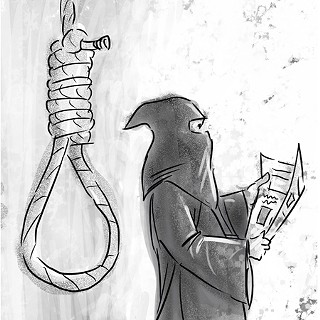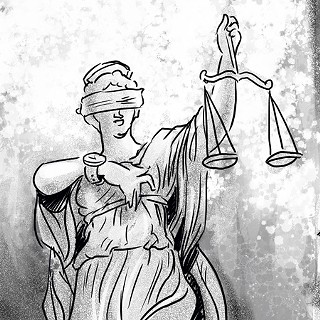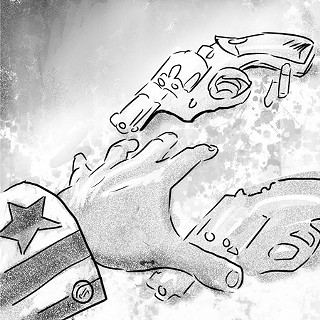Supremes Rule on Lawyers, Sex, and Guns
Court's rulings hit home
By Jordan Smith, Fri., July 4, 2008
'Kennedy v. Louisiana'
In a June 25 ruling, a 5-4 majority led by Justice Anthony Kennedy struck down a Louisiana law – and, by extension, relevant portions of an equivalent Texas law – making child rapists eligible for the death penalty. The state had argued that children are a "special class" of people in need of "special protection" under the law and that child rape is "unique in terms of the harm" inflicted on the "victim and society," concluding that "short of first-degree murder, there is no crime more deserving of death." But allowing the ultimate punishment for a crime that does not involve the death of the victim, no matter how abhorrent the crime, does not satisfy the Eighth Amendment's prohibition on cruel and unusual punishments nor the proportionality test. Generally, punishments are justified under "one or more of three principal rationales: rehabilitation, deterrence, and retribution. It is the last of these, retribution, that most often can contradict the law's own ends," Kennedy wrote. "When the law punishes by death, it risks its own sudden descent into brutality, transgressing the constitutional commitment to decency and restraint."
Restraint? Keep yer stinkin' restraint! This is Texas! For sure, the negative reaction to the Supremes' ruling by our fearless state officials – who nearly tripped over each other last year in the rush to claim credit for codifying Jessica's Law, making repeat child-sex offenders eligible for the death penalty – was swift and loud, if not well thought out: "In spite of this ruling, Texas children are still better off because the legislature had the courage to pass Jessica's Law," Rep. Debbie Riddle, R-Tomball, author of House Bill 8, said in a press release. Yes, thank God for the Texas Legislature.
'Rothgery v. Gillespie County'
The Sixth Amendment to the Constitution protects an individual's right to a lawyer. The provision applies across the board but is particularly potent protection for indigent defendants who might otherwise languish without access to an attorney. (To be sure, Texas hasn't enjoyed the best reputation when it comes to representation for the poor – think of the infamous case of the sleeping lawyer deemed not necessarily ineffective by our highest criminal appeals court.) But at what point in the criminal justice process is one sufficiently under the government's thumb that the right to counsel kicks in? That's the question the Supremes addressed in a case brought by Walter Rothgery, a former resident of Gillespie County, some 90 miles west of Austin, who was wrongly arrested in 2002 on a charge of being a felon in possession of a gun – thanks to a glitch in a California database. Rothgery was carrying a gun but was not a felon. He was arrested and taken before a county magistrate to have the charge reviewed and bail set; he was booked into jail, posted out on bond, and immediately asked for a lawyer. But his request was ignored by county officials until six months later, when Rothgery was finally indicted and again booked into jail on the weapon charge. When he finally got access to counsel, it didn't take long for the court-appointed lawyer to find the database error and present it to the District Attorney's Office; the charge against Rothgery was dismissed – it arguably could've been disposed of much earlier, at considerably less expense, had the county initially honored Rothgery's right to counsel.
Rothgery filed a federal civil rights suit against the county, but the federal court sided with Gillespie Co., which argued that Rothgery had no right to counsel before the D.A.'s office was formally involved in his case. Since the D.A. wasn't at Rothgery's magistration, the case hadn't officially begun, the court said.
Not so, the Supremes ruled June 23 in an 8-1 decision. The presence or absence of the D.A. at a hearing has no bearing on when an official "prosecution" actually begins, Justice David Souter wrote. In ruling against Rothgery's civil rights suit, "the [lower] court effectively focused not on the start of adversarial proceedings, but on the activities and knowledge of a particular state official," the D.A., "who was presumably otherwise occupied," at the time of Rothgery's magistration. "This was error." The court noted that 43 states initiate the counsel-appointment process at the magistration stage.
Notably, the court did not rule on whether the six months between the time Rothgery requested and received counsel was excessive, but, seemingly, it would be: Under Texas law, indigent defendants are to be appointed counsel between one and three days after requesting assistance. Court sources tell the Chronicle it is unlikely that the Supremes' ruling will have any additional fiscal impact on county budgets.
'District of Columbia v. Heller'
Saving the best for last, as is its habit, the court, on its last day of work, ruled 5-4 that the Second Amendment does protect an individual's right to bear arms and struck down the 30-year-old Washington, D.C., handgun ban. It is the court's first definitive ruling on the core meaning of the Second Amendment since the amendment was ratified in 1791. And it may not be such a surprising ruling, although the court divided along predictable lines – with the more liberal justices dissenting, arguing that instead of an individual right, the Second Amendment protects only a collective right (that of the state militia, an undeniably archaic institution) to bear arms. Given that interpretation, Justice Antonin Scalia, writing for the majority, found the restrictive D.C. gun ban to be clearly unconstitutional. But the court acknowledged that the right to arms is not an unfettered one: The ruling should not be taken to "cast doubt on longstanding prohibitions" on gun-ownership by felons or the mentally impaired or the carrying of firearms in "sensitive places" (schools, etc.) or laws that place conditions on the commercial sale of firearms, Scalia wrote. Still, D.C.'s law, banning the ownership of handguns and requiring lawfully owned long guns to be kept disassembled or with operable trigger locks, was going too far, he wrote, in part, because the "prohibition extends ... to the home, where the need for defense of self, family, and property is most acute." And therefore, a total ban on handguns – the nation's most popular personal armament – would contravene the Constitution. After all, the handgun, Scalia opined, is preferable for home defense for a variety of reasons – including that "it can be pointed at a burglar with one hand while the other hand dials the police." Indeed.
The court's ruling will immediately call into question similar firearm bans in San Francisco and Chicago and has quickly earned the ire (if not a bit of Chicken Little-like fretting about swift upticks in gun-related violence) of police chiefs in several major urban centers.
The stage is now clearly set for round two.
Got something to say on the subject? Send a letter to the editor.













